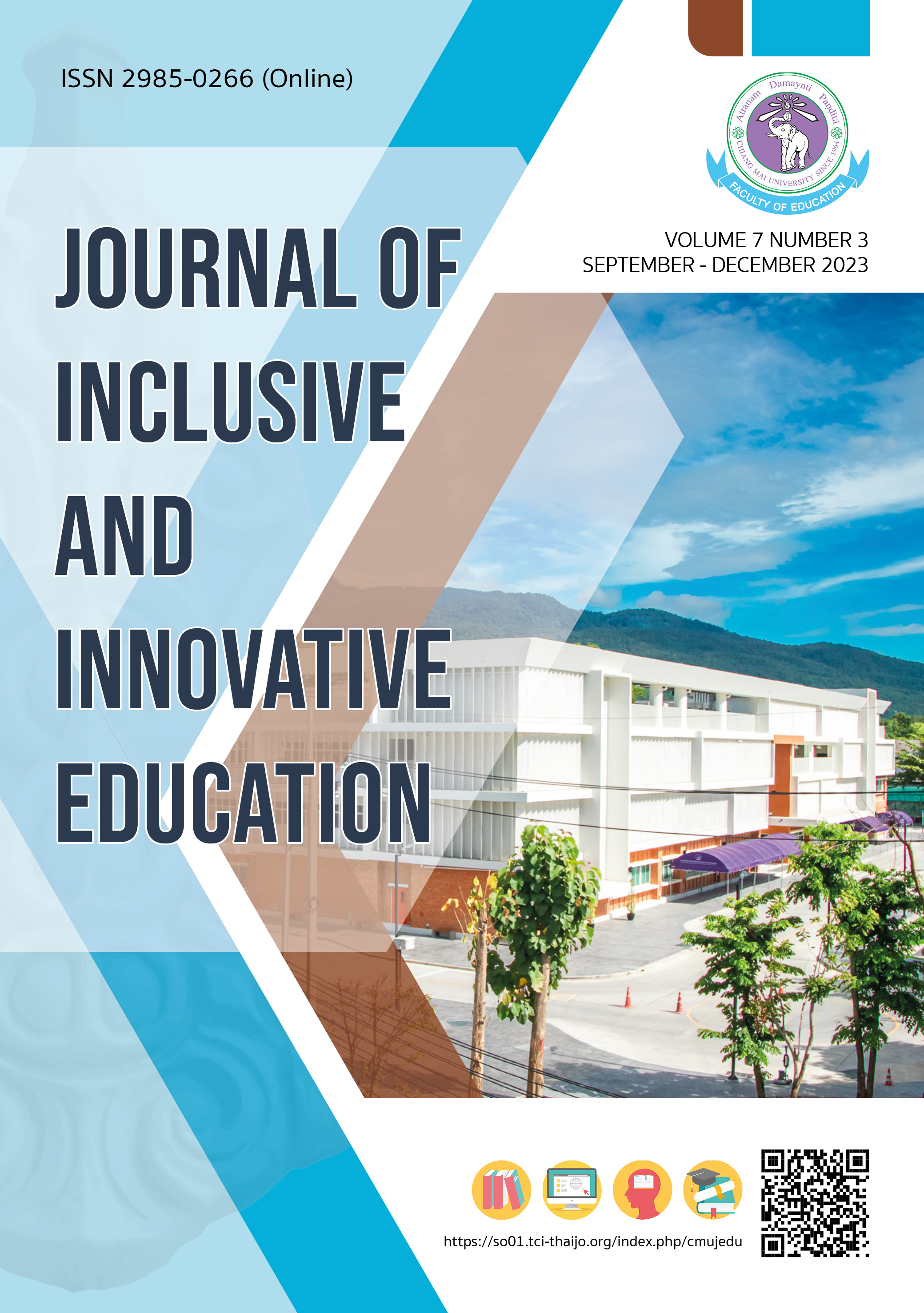การศึกษาความตระหนักในสถานการณ์การพัฒนาทรัพยากรทางวัฒนธรรมและปัจจัยในการขับเคลื่อนระบบนิเวศการเรียนรู้ของการท่องเที่ยวเชิงวัฒนธรรม Satun UNESCO Global Geopark
Main Article Content
บทคัดย่อ
งานวิจัยนี้เป็นงานวิจัยเชิงคุณภาพ เพื่อทำความเข้าใจสถานการณ์การพัฒนาทรัพยากรทางวัฒนธรรมเพื่อการพัฒนาระบบนิเวศการเรียนรู้ และปัจจัยขับเคลื่อนระบบนิเวศการเรียนรู้ของการท่องเที่ยวเชิงวัฒนธรรมในพื้นที่ Satun UNESCO Global Geopark โดยศึกษาข้อมูลจากกลุ่มขับเคลื่อนนโยบาย จำนวน 6 กลุ่มตัวอย่าง และกลุ่มผู้ประกอบการด้านการท่องเที่ยวจำนวน 7 กลุ่มตัวอย่าง เครื่องมือการวิจัยประกอบด้วย การสำรวจและสัมภาษณ์แบบไม่มีโครงสร้าง และ Co-Creation Workshop และวิเคราะห์ข้อมูลผ่านเครื่องมือ Design Thinking และ Case Development กับผู้มีส่วนได้เสียในพื้นที่อย่างเป็นระบบ ผสานการทำ Scenario Development โดยมีผลการวิจัยคือ แบบจำลองสถานการณ์บทบาทของทรัพยากรทางวัฒนธรรมในการพัฒนานิเวศการเรียนรู้ตามวัตถุประสงค์งานวิจัย และปัจจัยในการขับเคลื่อนระบบนิเวศการเรียนรู้ คือ 1) เนื้อหาด้านวัฒนธรรม 2) รูปแบบกิจกรรมการเรียนรู้ และ 3) การพัฒนาพื้นที่การเรียนรู้ รวมถึงนำเสนอแนวทางการใช้ประโยชน์งานวิจัยใน 3 ระดับ คือ 1) แนวทางคัดกรองทรัพยากรทางวัฒนธรรมเพื่อการพัฒนากิจกรรมการเรียนรู้บริการนักท่องเที่ยว 2) การพัฒนา Theme ท่องเที่ยวของพื้นที่ Satun UNESCO Global Geopark เพื่อการสร้างโอกาสทางธุรกิจการท่องเที่ยวแบบกลุ่ม และ 3) แนวนโยบายการพัฒนาพื้นที่และสิ่งอำนวยความสะดวกเพื่อสนับสนุนการท่องเที่ยวเชิงวัฒนธรรมแบบต่าง ๆ ซึ่งผลลัพธ์ของงานวิจัยสามารถสร้างความตระหนักอย่างมากกับผู้เกี่ยวข้องในการพัฒนาทรัพยากรทางวัฒนธรรมในการขับเคลื่อน Satun UNESCO Global Geopark Learning Ecology นอกเหนือจากการพึ่งพาทรัพยากรทางธรณีวิทยาเพียงอย่างเดียว
Article Details

อนุญาตภายใต้เงื่อนไข Creative Commons Attribution-NonCommercial-NoDerivatives 4.0 International License.
หากผู้เสนอบทความมีความจำเป็นเร่งด่วนในการตีพิมพ์โปรดส่งลงตีพิมพ์ในวารสารฉบับอื่นแทน โดยกองบรรณาธิการจะไม่รับบทความหากผู้เสนอบทความไม่ปฏิบัติตามเงื่อนไขและขั้นตอนที่กำหนดอย่างเคร่งครัด ข้อมูลของเนื้อหาในบทความถือเป็นลิขสิทธิ์ของ Journal of Inclusive and Innovative Education คณะศึกษาศาสตร์ มหาวิทยาลัยเชียงใหม่
เอกสารอ้างอิง
Brown, T. (2009). Change By Design. New York: HaperCollins Publishers.
Bureau of International Cooperation. (2022). SatunUNESCO Global Geopark. Retrieved From https://bic.moe.go.th/index.php/2021-08-19-21-31-29/796-unesco-global-geopark. [In Thai]
Center of Innovation for Society KMUTT. (2020). The Standard of Space Management for Learning and Reading Space in Learning Park. Bangkok: TK Park, Office of Knowledge Management and Development Public Organization.
Cohen, E. (1979). A Phenomenology of Tourist Experience, Sociology -the Journal of The British Sociological Association – SOCIOLOGY, 13, 179-201.
Gel, J. (2013). Life Between Building. Washington, DC: Island Press.
Jaruworn, P. (2017). Image Creation of Cultural Village : Folklore from Tourism Scene at Nong Kao Community. Bangkok: Princess Maha Chakri Sirindhorn Anthropology Centre. [In Thai]
Jittangwatana, B. (2014). Sustainable tourism development. (Edition 2). Bangkok: Dharmasarn Printing
Co.,ltd. [In Thai]
Kaewthep, K. (2017). The tool of cultural community and ritual study. Bangkok: Princess Maha Chakri Sirindhorn Anthropology Centre (Public Organisation). [In Thai]
Kanchanapan, A. (2022). Complex Thinking Approaches in Community Research. Bangkok: Thailand Research Fund. [In Thai]
Khamhank, S. (2022). 5 Considerations “Destruction Through Policy” Satun UNESCO Global Geopark. Retrieved From https://greennews.agency/?p=28200 [In Thai]
Manzini, E. (2023). When Everybody Designs: An Introduction to Design for Social Innovation. (Translated by Promsoa, K). Nonthaburi: INI-Innovation Network International Co.,Ltd.
Ministry of Natural Resources and Environment. (2018). UNESCO announces certification of Thailand's
first UNESCO Global Geopark. Retrieved from https://www.mnre.go.th/th/news/detail/15120.
Montgomery, C. (2015). Happy City Transforming Our Lives Through Urban Design. United Kingdom: Penguin Books.
Office of Knowledge Management and Development (Public Organization). (2023). The Learning Ecology for Future world. Retrieved from https://www.tkpark.or.th/tha/blog_detail/ 1606707624313/สร้างระบบนิเวศการเรียนรู้-เพื่อรับมือโลกแห่งอนาคต. [In Thail]
Office of Knowledge Management and Development (Public Organization). (2023). ‘The Learning City’ The new Approaches of education. Retrieved from https://www.thekommon.co/learning-ecosystem-intro/. [In Thail]
Ratanasuwongchai, N. (2011). Cultural Tourism Development Strategies. Journal of Studies in the Field of Humanities, 18 (1), 31-50.
Robinson, K., and Aronica, L. (2021). Creative Schools. (Translated by Pitachamook, W). Bangkok: Bookscape.
Santasombut, Y. (2016). Human and Culture. Bangkok: Thammasat University Publisher. [In Thail]
Sawangchote, W. (2018). Cultural Industry and Creative Economy. Bangkok: Social Enterprise Leadership Center.
Satun Provincial Agriculture and Cooperatives Ofiice. (2023). Agriculture Information of Satun of Budget Year 2021. Retrieved from https://www.opsmoac.go.th/satun-dwl-files-431491791162. [In Thai]
Thailand Creative Design Center. (2012). Creative City. Bangkok: Thailand Creative Design Center.
Thungprue, N., Saithanoo, S., Putsukee, T., Kecharananta, N. (2022). SATUN UNESCO GLOBAL GEOPARK AND COMMUNITY PARTICIPATION IN LOCAL ECONOMIC DEVELOPMENT. NRRU Community Research Journal, 17 (1), 55-68.
Thailand Knowledge Park. (2023). The Learning City – Build the Lifelong Learning City. Retrieved from https://www.tkpark.or.th/eng/articles_detail/1651231619612/. [In Thai]


